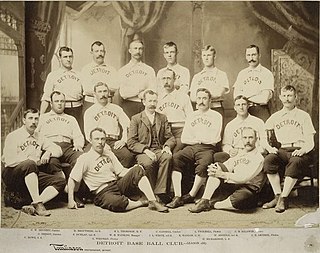Sam Thompson (outfielder)
Samuel Luther Thompson (March 5, 1860 – November 7, 1922), nicknamed "Big Sam", was an American professional baseball player from 1884 to 1898 and with a brief comeback in 1906.
Thompson still holds the major league record for most RBIs in a single month with 61 in August 1894 while playing for the Phillies.
[1][2] In July 1884, Thompson began his professional baseball career at age 24, playing for the Evansville, Indiana, team in the Northwestern League.
A scout for Evansville travelled to Danville and was referred to "Big Sam", who was working on a roof in Stinesville.
[5] In mid June 1885, the Western League disbanded, and a mad rush developed to sign the players on the Indianapolis roster,[5] a line-up that included Thompson, Deacon McGuire, Sam Crane, Chub Collins, Jim Donnelly, Mox McQuery, Gene Moriarty, and Dan Casey.
Detroit sent two representatives (Marsh and Maloney) to Indianapolis, principally to sign the Hoosiers' battery of Larry McKeon and Jim Keenan.
The Wolverines were outbid by the Cincinnati Reds for McKeon and Keenan but wound up with the Hoosiers' manager (Bill Watkins) and the rest of the team's starting lineup.
We lived on the best in the market, and spent the rest of the time in fishing and playing poker, chips having very thoughtfully been provided.
[6] The 1886 Wolverines compiled an impressive 87–36 record (.707 winning percentage), but lost the National League pennant, finishing 2½ games behind the Chicago White Stockings.
[12] The 1887 Detroit Wolverines featured four future Hall of Fame inductees (Thompson, Dan Brouthers, Deacon White, and Ned Hanlon) and won the National League pennant with a 79-45 record.
Thompson played in all 15 games of the World Series and led all hitters with a .362 average, two home runs, seven RBIs and a .621 slugging percentage.
[6] (It has been suggested that Thompson's assist and home run totals in Philadelphia were aided by the short 300-foot right field fence at the Huntingdon Street Grounds.
[6] After the 1893 season, Thompson vowed not to return to Philadelphia in protest over the owners' penny-pinching ways and the team's inability to compete for a pennant.
In October 1893, Thompson announced: "I shall not play again in Philadelphia, and I told Harry Wright it would be a waste of time for him to write to me about signing.
All four Philadelphia outfielders ended the season with a batting average better than .400 (Tuck Turner at .416, Thompson and Ed Delahanty at .407, and Billy Hamilton at .404).
[24] Despite the injury and partial amputation, and being limited to only 102 games, Thompson compiled a .407 batting average with a career-high 28 triples and a league-leading 147 RBIs.
[6] One sports writer noted that, even at age 38, Thompson "possessed an arm that the fastest sprinters in the big league had a lot of respect for.
Six clubs, Cincinnati Baltimore, Boston, New York, Cleveland and Brooklyn are bound to beat them, and they will have to fight hard to lead the second division, and I very much doubt if they can do that.
"[29] Though his loyalty to the Phillies was questioned,[29] Thompson did return in 1898 and was batting .349 with 15 RBIs, five doubles, three triples, a home run after 14 games.
[30] Late in the 1906 baseball season, Thompson briefly returned to the major leagues as a player for the Detroit Tigers.
With starting outfielders Ty Cobb and Davy Jones out of the Tigers lineup with injuries, Thompson volunteered to fill in.
At age 46, Thompson had remained active, playing baseball for the Detroit Athletic Club and other local teams.
[12] Detroit sports writer Paul H. Bruske noted that Thompson was still able to throw the ball from deep right field to the plate "on a line" and that he still had "a lot of speed on the bases.
"[31][32] In 15 major league seasons, Thompson compiled a .331 batting average with 1,988 hits, 343 doubles, 161 triples, 126 home runs, 1,305 RBIs, and 232 stolen bases.
Thompson still holds the major league record for most RBIs in a single month with 61 in August 1894 while playing for the Phillies.
"[16] Bill Watkins, who managed Thompson in Detroit, recalled: "He was a fine fielder and had a cannon arm and will live in my memory as the greatest natural hitter of all time.
"[38] In a 1913 story on Thompson, Detroit sports writer Maclean Kennedy noted that Thompson's drives "were the direct cause of more hats being smashed, more backs that were thumped til they were black and blue by some wild-eyed fan sitting in the seat behind, more outbursts of frenzied shrieks and howls of glee, than those of any other player who ever wore a Detroit uniform", barring only the two great stars of the day, Ty Cobb and Sam Crawford.
He was appointed a U.S. Deputy Marshall during World War I and also worked as the crier in the courtroom of U.S. District Court Judge Arthur J. Tuttle.
He had a heart attack while serving as an election inspector on November 7 and was stricken again later in the morning after being taken to his home located at 6468 Trumbull Avenue in Detroit.
"[38][40] At Thompson's funeral, "Michigan's foremost citizens – state and city officials, judges, bankers, doctors, millionaires, laborers – paid homage ... to their beloved friend", and the neighborhood in which Thompson lived "was packed with expensive automobiles and their liveried chauffeurs" as workmen and wealthy men "discussed their favorite player with an unusual spirit of camaraderie.


